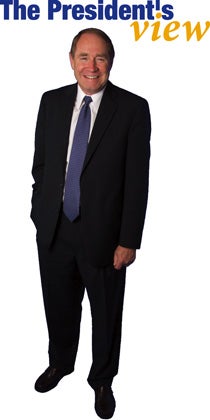Transformation
 I would guess that very few members of the larger URI community—our alumni, friends, and partners—are unaware of the substantial challenges facing public higher education in Rhode Island and across the United States. Many of these relate to the precarious balancing act among access, affordability, and quality in which public research universities are engaged. Less evident, perhaps, are the challenges we face in adapting to the global demands of the 21st century. Of course, the economic climate is foremost among these, but other factors are also important to our future: Globalization, climate change, development, health, energy, political and regional conflicts, and more. Collectively, these challenges compel the University of Rhode Island to critically assess and transform its teaching, research, and service to prepare our students and help our nation to thrive in the 21st century.
I would guess that very few members of the larger URI community—our alumni, friends, and partners—are unaware of the substantial challenges facing public higher education in Rhode Island and across the United States. Many of these relate to the precarious balancing act among access, affordability, and quality in which public research universities are engaged. Less evident, perhaps, are the challenges we face in adapting to the global demands of the 21st century. Of course, the economic climate is foremost among these, but other factors are also important to our future: Globalization, climate change, development, health, energy, political and regional conflicts, and more. Collectively, these challenges compel the University of Rhode Island to critically assess and transform its teaching, research, and service to prepare our students and help our nation to thrive in the 21st century.
We have identified four transformational goals for the University of Rhode Island. If we achieve these goals, URI will continue to be a leader in preparing its students for success. If we achieve these goals, URI—through the work of its faculty and students—will have a major impact on economic renewal in our state and region, and in maintaining our quality of life. The transformational goals for the University of Rhode Island are as follows:

Creating a 21st Century 24/7 Learning Environment: To prepare our students to excel and lead, URI must take full and systemic advantage of the most advanced educational tools and practices. We must provide expanded opportunities for experiential learning (research, creative work, and scholarship), as well as opportunities to learn and work across disciplines and fields of knowledge. It is essential to provide “hands-on” learning—for example, in research laboratories, in field work, and in internships. Through the use of technology, improved advising, and innovative curricula URI must do its part to reduce barriers to graduation and enable more of our students to complete their degrees in four years.
Increasing the Magnitude, Prominence, and Impact of URI’s Research, Scholarship, and Creative Work: URI must place additional emphasis on its core mission of research, scholarship, and creative work. To do so will help preserve and enhance the nation’s global competitiveness; help create a Rhode Island economy that is vibrant, competitive, and sustainable; help provide new knowledge, understanding, and insight; and will enrich our culture and society. Increasing the research, scholarship, and creative work undertaken by our faculty and research staff will provide more opportunities for students to be engaged in these activities, thereby providing a stronger education.
Internationalizing and Globalizing the University of Rhode Island: It is simply essential for our students’ success that they are prepared to work and live in an increasingly globalized economy and society. It is essential to the future of Rhode Island and the U.S. that we improve our competitive position internationally and that we are globally engaged. URI must substantially increase the number of our students who study abroad and the number of international students who study at URI. We must expand the number and scope of our international research and education partnerships.
Building a Community at the University of Rhode Island that Values and Embraces Equity and Diversity: In order for our students to thrive in an increasingly diverse and complex context, URI must assist them in developing their abilities to communicate, understand, and engage productively with people who are very different than they are. Building a community at URI in which every member is welcomed, supported, and valued is an essential foundation to education and learning, and therefore is central to our identity and mission.
—David M. Dooley
 Home
Home Browse
Browse Close
Close Events
Events Maps
Maps Email
Email Brightspace
Brightspace eCampus
eCampus


